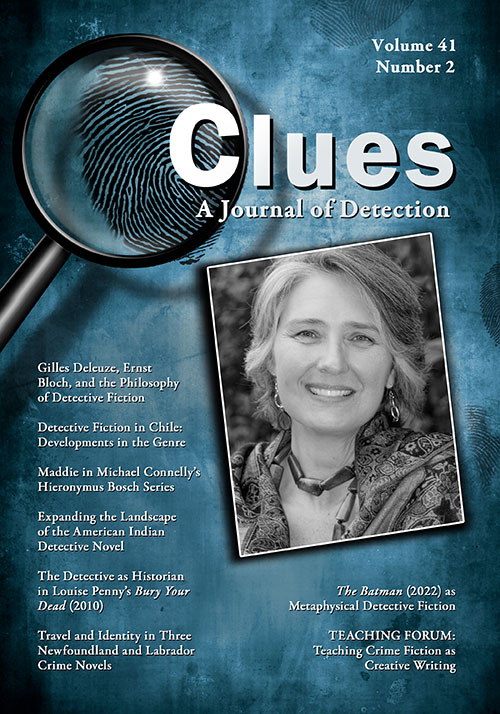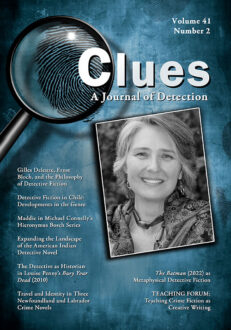Clues: A Journal of Detection, Vol. 41, No. 2 (Fall 2023)
Print Back Issue$30.00
In stock
About the Book
BACK ISSUE
This is a single back issue only. To order a current subscription, or for more information, please visit the journal’s web page at CluesJournal.com. Back issues from earlier volumes of Clues are available for order subject to availability. Also, single issues of the current volume may be ordered one at a time. Individuals may order back issues directly from our online catalog, and the charge for individuals is $30 (excluding postage). Issues from Volume 33 to the present are also available in ebook format on Kindle, Nook and Google Play.
The charge for single issues for institutions is $75 per issue (excluding postage). If your institution requires a back issue, please contact us to order at the appropriate rate.
About the Author(s)
Bibliographic Details
Executive Editor Caroline Reitz
Managing Editor Elizabeth Foxwell
Consulting Editor Margaret Kinsman
Format: softcover (7 x 10)
Pages: 125
Bibliographic Info: index
Copyright Date: 2023
ISSN 0742-4248
Imprint: McFarland
Table of Contents
Introduction: “The Warp and Woof of Every Moment”
caroline reitz 5
The executive editor of Clues provides an overview of the issue, including articles on Chilean crime fiction, on Batman, and on detective fiction and philosophy; a Teaching Forum on the relationship of crime fiction and creative writing; and articles on authors Sherman Alexie, Michael Connelly, Craig Johnson, Kevin Major, and Louise Penny.
Spotlight on… Detective Fiction in Chile: Developments in the Genre
kate m. quinn 8
This article discusses the consolidation in the 1990s of Chile’s neopolicial works that combine hard-boiled and political elements, reassesses earlier twentieth-century genre writers, and examines the wider diversity of production up to the present day. It considers the conditions of genre production in Chile and the challenge of wider access to international readers.
“Still harping on daughters”: Maddie in Michael Connelly’s Hieronymus Bosch Series
heather dubrow 21
In Michael Connelly’s books about detective Hieronymus Bosch, Bosch’s daughter Maddie is closely connected to many preoccupations of the series even when a seemingly minor presence. Romance texts such as Arthurian narratives and Spenser’s Faerie Queene are the best keys to interpreting Maddie’s roles in the series and larger questions about crime fiction.
From Alexie’s Indian Killer to Johnson’s Longmire Series: Expanding the Landscape of the American Indian Detective Novel
elizabeth abele 31
The essay examines Sherman Alexie’s Indian Killer, a crime novel that critiques Native American culture mediated through White American commerce, authors, and academics, as well as Craig Johnson’s Longmire series as a development and a departure from American Indian crime fiction in the late-twentieth century.
“Not everything buried is actually dead”: The Detective as Historian in Louise Penny’s Bury Your Dead (2010)
aoileann ní éigeartaigh 43
Louise Penny’s Bury Your Dead (2010) inserts a Francophone detective into the heart of English culture in Québec, facilitating an investigation of historical Québécois tensions between the communities. Inspector Gamache’s resolution of the case suggests that acknowledging these cultural differences and finding a way to compromise are characteristics that continue to distinguish contemporary Canadian society.
Sunset Tourism in Kevin Major’s One for the Rock, Two for the Tablelands, and Three for Trinity: Travel and Identity in Three Newfoundland and Labrador Crime Novels
tom halford 53
This essay considers the complex relationship among crime fiction, tourism, and identity in One for the Rock, Two for the Tablelands, and Three for Trinity by Kevin Major, which are set in the Canadian province of Newfoundland and Labrador. Major flirts with the concept of dark tourism as he takes readers into sites of loss and trauma but ultimately is more invested in highlighting and preserving aspects of provincial identity.
Chiaroscuro: Gilles Deleuze, Ernst Bloch, and the Philosophy of Detective Fiction
gray kochhar-lindgren 64
Philosophy and detective fiction have relied on a regime of truth in which the darkness of crime is brought into the light of knowledge through a rational process of reconstructing clues toward a telos of explanation. The oscillations of noir—a dynamic play of the differential forces of darkness and light—keep reading, writing, and thinking in play.
Riddle Me This: The Batman (2022) as Metaphysical Detective Fiction
daniel carrigy 73
This article examines Matt Reeves’ The Batman (2022) as a seminal, contemporary instance of metaphysical detective fiction (MPDF). In doing so, it explores the extent to which Reeves engages with the genre’s history and utilizes its dominant conventions to interrogate notions of identity and the self in Gotham City.
TEACHING FORUM: Teaching Crime Fiction as Creative Writing
Teaching Crime Fiction as Creative Writing: Introduction
j.c. bernthal 87
The organizer of this issue’s Teaching Forum on the multifaceted relationship of crime fiction and creative writing introduces the forum.
The Adrenalin Knowledge Gap
alison taft 89
The author describes her writing workshop, designed to enable students to work with subtext through the construction of a traditional crime fiction narrative and to encourage participants to recognize and set these skills within a wider employability framework.
It’s No Mystery: What Genre Fiction Can Teach All Writers
art taylor 91
Studying writers of suspense (crime, mystery, horror) provides valuable tools to enhance the work of graduate and undergraduate student writers, whether their ambitions are genre-related or not. Such skills, shared by genre and non-genre (i.e., “literary”) writers, include crafting compelling characters, pacing surprise and suspense, and navigating twists and reversals.
Needing to Nail Down “Noir” for Creative Writing Students
richie narvaez 94
Clearly defining the different subgenres of crime fiction—in particular, noir, because of its overuse and attenuated definition in popular culture—helps students better appreciate and analyze the works of other authors, which can be beneficial for their own writing and overall literary education as well as writing careers.
How We Know What We Know: Crime Fiction in Creative Composition Writing
miranda steege 96
This essay explores how reading and writing crime fiction in college composition classes can be used to teach close reading and engage students in multiple epistemological methodologies. Through creative assignments such as constructing their own detective character, students practice and critique various modes of knowledge.
Creative Crime Writing and “Enacted Criticism”
andrew green 98
This essay considers the creative writing PhD in relation to Golden Age crime writing as an intellectual “space” that operationalizes practice drawing on creative and critical domains. It explores how both function together to create a third dimension that might be termed “enacted criticism.”
Reading Crime Fiction, Writing Crime Fiction, and Overcoming the Tyranny of the Calendar
mary anna evans 101
Designing a crime fiction writing course requires familiarizing students with some classics of the field and exposing them to present-day authors while preserving the time they need to write. The author describes a curriculum that pairs related works, old and new, to provide a foundation for students’ crime stories.
Build-A-Mutant, Save the World: Metrics, Murder, and Mayhem in Bryan Singer’s X-Men: Days of Future Past
tom ue 104
In a creative writing assignment, students respond to the conflicts in Bryan Singer’s X-Men: Days of Future Past (2014) by designing their own mutants and by making several decisions for them. Through this exercise, students learn how metrics work as well as the importance of making meaningful social change.
Using Creative Writing in English Literature Assessment: Diversity and Inclusion on an Undergraduate Crime Fiction Module
charlotte beyer 107
This essay reflects on the use of creative writing as assessment for English literature students on a crime fiction module. It examines the pedagogical aims and objectives underpinning the use of creative writing alongside conventional academic essay writing styles to engender more diverse and inclusive assessment forms.
REVIEWS
Jane Custance Baker. Fear and Clothing: Dress in English Detective Fiction Between the First and Second World Wars
lisa hopkins 111
Robert Arnett. Neo-Noir as Post-Classical Hollywood Cinema
scott szeljack 112
Anne Grydehøj. Contemporary French and Scandinavian Crime Fiction: Citizenship, Gender and Ethnicity
jennifer schnabel 114
Clues Index, Volume 41 117
Author Guidelines are on page 125.
Book Reviews & Awards
- “Clues is a must-have for readers and writers of crime fiction. Scholarly, thought-provoking, wide-ranging in its topics, Clues covers the crime and thriller map.”—Sara Paretsky
- “A. Conan Doyle, notoriously resentful of Sherlock Holmes’s success, liked to scorn ‘police romances’ as less significant and worthy of his talents than his other literary work. If he could have read Clues, the thinking mystery reader’s journal, he would surely have felt differently—and learned much he never realized himself about even his own landmark contribution to the genre, from which so much else by others has flowed.”—Jon Lellenberg, U.S. agent for the Arthur Conan Doyle estate
- “I love reading Clues. Every issue provides thought-provoking, well-researched articles. The variety and scope of the material found in Clues makes an unparalleled, ongoing contribution to our understanding of the role of crime fiction in our culture, and the genre’s reflection of its time and society.”—Jan Burke, Edgar-winning author of The Messenger (2009)
- “Clues is an important journal. It carries the torch of tradition that is the backbone of detective fiction. It goes below the surface and gets to the heart of what makes the genre so fascinating and valid today”—Michael Connelly, author of the Harry Bosch novels, including The Overlook (2007)
- “for erudite and fascinating truths about mysteries, follow the clues to Clues, the scholarly journal that is an essential resource for every serious student of the mystery”—Carolyn Hart, author of Death Walked In (2008)
- “with scholarship ranging from Poe to Peters, nothing beats Clues”—Joan Hess, author of Mummy Dearest (2008).





